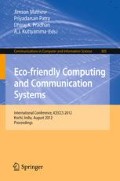Abstract
Energy minimization is an important factor in designing digital circuits which are portable and battery operated.Irreversible logic operation causes the minimum dissipation of KT ln 2 joules of heat energy when each bit is erased.Reversible logic that employs adiabatic switching principles can be used to minimize dynamic power , which is the major contributor to total power dissipation. Reversible Energy Recovery Logic (RERL) belongs to fully adiabatic logic family and it eliminates non adiabatic energy loss by making use of reversible logic. RERL NAND/AND gate and RERL SR latch is proposed in this work using eight phase clocking scheme. This RERL circuits consume less energy compared with static CMOS logic circuits at low speed operation. The simulation result using HSPICE shows that RERL circuits consume less power compared with the static CMOS circuits.
Access this chapter
Tax calculation will be finalised at checkout
Purchases are for personal use only
Preview
Unable to display preview. Download preview PDF.
References
Lim, J., Kim, D.-G., Chae, S.-I.: Reversible energy recovery logic circuits and its 8 phase clocked power generator for ultra low power application. EICE Trans. Electron E82-C(4) (1999)
Khatir, M., Ejlali, A., Moradi, A.: Improving the energy efficiency of reversible logiccircuits by the combined use of adiabatic styles. Integration, The VLSI Journal 44 (2010)
Sunil Gavaskar Reddy, Y., Rajendra Prasad, V.V.G.S.: Comparison of CMOS and Adiabatic Full Adder Circuits. International Journal of Scientific & Engineering Research 2 (2011)
Athas, W.C., Svensson, L.J., Koller, J.G., Tzartzanis, N., Chou, Y.: Low-power digital systems based on adiabatic-switching principles. IEEE Trans. VLSI Systems 2(4), 398–406 (1994)
Athas, W.C., Svensson, L.J.: Reversible Logic Issues in Adiabatic CMOS. In: IEEE Conf. on Physics and Computation (1994)
Kim, S., Ziesler, C.H., Papaefthymiou, M.C.: Charge recovery computing on silicon. IEEE Trans. on Computers 54 (2005)
Lim, J., Kim, D.G., Chae, S.-I.: A 16-bit carry-lookahead adder using reversible energy recovery logic for ultra-low-energy systems. IEEE J. Solid-State Circuits 34(6), 898–903 (1999)
Lim, J., Kim, D.-G., Chae, S.-I.: nMOS Reversible Energy Recovery Logic for Ultra-Low-Energy Applications. IEEE J. Solid-State Circuits 35(6) (2000)
Author information
Authors and Affiliations
Editor information
Editors and Affiliations
Rights and permissions
Copyright information
© 2012 Springer-Verlag Berlin Heidelberg
About this paper
Cite this paper
C.S., S.J., Kayalvizhi, N. (2012). Adiabatic Technique for Designing Energy Efficient Logic Circuits. In: Mathew, J., Patra, P., Pradhan, D.K., Kuttyamma, A.J. (eds) Eco-friendly Computing and Communication Systems. ICECCS 2012. Communications in Computer and Information Science, vol 305. Springer, Berlin, Heidelberg. https://doi.org/10.1007/978-3-642-32112-2_13
Download citation
DOI: https://doi.org/10.1007/978-3-642-32112-2_13
Publisher Name: Springer, Berlin, Heidelberg
Print ISBN: 978-3-642-32111-5
Online ISBN: 978-3-642-32112-2
eBook Packages: Computer ScienceComputer Science (R0)

